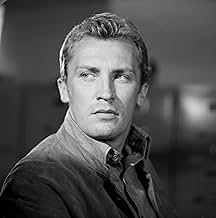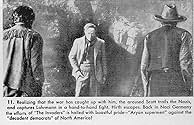A World War II U-boat crew are stranded in northern Canada. To avoid internment, they must make their way to the border and get into the still-neutral U.S.A World War II U-boat crew are stranded in northern Canada. To avoid internment, they must make their way to the border and get into the still-neutral U.S.A World War II U-boat crew are stranded in northern Canada. To avoid internment, they must make their way to the border and get into the still-neutral U.S.
- Won 1 Oscar
- 9 wins & 2 nominations total
Featured reviews
Clearly propaganda, the cast and crew apparently came from all parts of the world to lend their talents for a "mutual cause." With strains of Ralph Vaughn Williams's score woven into the cinematic fabric, Pressberger's elaborate story is expansive and involved.
The Oscar nominated film is worth watching, and it's interesting to see Raymond Massey's speech as a G.I. so very Yank-oriented, without a trace of the mannered style he later acquired. Leslie Howard is well cast as a poetic, philosophical dreamer. However, it's Anton Walbrook who really surprises with an uncharacteristic subtle naturalistic style.
This is apparently the project Elizabeth Bergner used to defect from Germany to the U.S., leaving the film for Hollywood (and Glynis Johns to take over the role). The actors playing Nazis are all quite strong.
When a German submarine is destroyed in Hudson Bay, Canada, the surviving Nazi soldiers led by the fiercely patriotic Kommandant Bernsdorff (Richard George) must navigate their way across the country into the then-neutral United States of America. The native citizens they meet along the way are largely jovial and laid-back, many hardly aware of the war raging across the Atlantic, and the Germans haughtily deem them foes unworthy of the Fuhrer's might. But these Canadians, as placid as they first seem, can surely recognise fascism when they see it, and each of the soldiers is picked off one by one, like the characters from a war-themed version of Agatha Christie's "And Then There Were None." Among the unwitting local patriots is French-Canadian trapper Laurence Olivier a caricature but an entertaining one anthropologist/author Leslie Howard, and grinning deserter Raymond Massey, each of whom shows the Nazis that they're dealing with an enemy whose sheer spirit overshadows all of Hitler's armies combined.
The film was apparently intended as a tribute to Canada's involvement in the war, and perhaps as was Hitchcock's 'Foreign Correspondent (1940)' a call-to-arms for the then-isolationist United States, who would hold back until the Japanese attack on Pearl Harbour in December 1941. Many of the film's characters remark upon the sheer remoteness of the war relative to their own lives, unaware that it is actually standing before them; this idea was almost certainly aimed at American audiences. After the brilliantly suspenseful first act at Hudson Bay, I initially felt that the film was going off track by continuing to follow the Germans after their aerial departure from the remote village. However, as time wore on, I began to appreciate what the film was aiming for. Though the snow-swept slopes around Hudson Bay may seem leagues away from the Canadian/American border, Kommandant Bernsdorff and his ever-dwindling band gradually progress their way south, until, not only does he reach the border, but he physically crosses into the United States. The War had never been closer.
Did you know
- TriviaOn a trip home to Wales, Niall MacGinnis was stopped and searched by police. He was arrested as a German spy when the police found a photo in his wallet of MacGinnis dressed in a German sailor's uniform, standing next to what appeared to be a U-boat. In fact, it was a publicity photo from MacGinnis' role in this movie. MacGinnis spent several days in jail before documents were sent from London verifying that he had been in the movie.
- GoofsWhen the train is going over the railroad bridge at Niagara Falls ostensibly traveling from Canada to the U.S., it actually is heading from the U.S. into Canada. The water in the Niagara River under the bridge in the scene is coming toward the camera, with the train moving across the bridge from left to right. Canada would be on the right in the shot, the direction the so-called U.S. bound train is traveling.
- Quotes
[first lines]
Prologue: I see a long, straight line athwart a continent. No chain of forts, or deep flowing river, or mountain range, but a line drawn by men upon a map, nearly a century ago, accepted with a handshake, and kept ever since. A boundary which divides two nations, yet marks their friendly meeting ground. The 49th parallel: the only undefended frontier in the world.
- Crazy credits(Spoken introduction) "I see a long straight line athwart a continent. No chain of forts, or deep flowing river, or mountain range, but a line drawn by men upon a map nearly a century ago, accepted by a handshake and kept ever since. A boundary which divides two nations yet marks their friendly meeting grounds, the 49th parallel, the longest undefended frontier in the world."
- Alternate versionsThe initial American release had many cuts made to avoid upsetting some special interest groups. the running time was cut from 123 minutes to 104 minutes. Most of the submarine's voyage up to Hudson Bay was removed. They dive after sinking the freighter (and filming her crew) and we next see them in the Bay, preparing to send the raiding party ashore. All the scenes of them entering the Bay, including the reference to "his charts" (the missionary's), were cut. They cut all references to the "flying missionary" who was a German spy, the scenes with the map and all of it. They also cut the other "delicate" passage there, where Hirth tells the captive Canadians that the Eskimos are sub-apes like Negroes, only one step above the Jews, and the ripostes from Johnnie and the Factor. Obviously they didn't want to offend southern segregationists or anti-Semites by showing that Nazis shared their racist views, or leave in any dialogue decrying same.
- SoundtracksAlouette
(uncredited)
Traditional French folksong
Sung to accompaniment of accordion by Laurence Olivier
- How long is The Invaders?Powered by Alexa
Details
- Release date
- Country of origin
- Languages
- Also known as
- The Invaders
- Filming locations
- Banff, Banff National Park, Alberta, Canada(Indian Day scenes)
- Production company
- See more company credits at IMDbPro
Box office
- Budget
- £132,000 (estimated)
- Runtime2 hours 3 minutes
- Color
- Aspect ratio
- 1.37 : 1

















